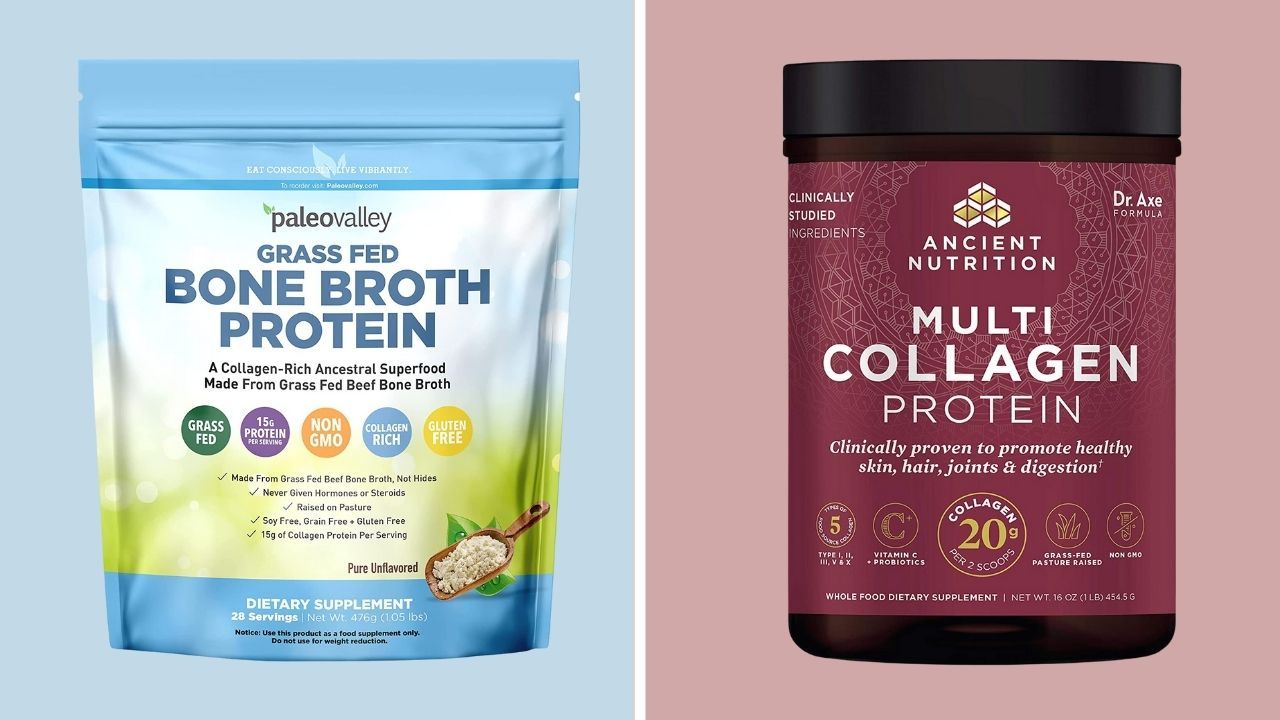
Can You Take Collagen While Pregnant | Let's Find Out!
Understand the role of collagen during pregnancy. Our article answers the question: Can you take collagen while pregnant? Learn more here.
We know that when you're expecting, you would do anything to ensure the health and well-being of your little one. It's a time filled with excitement, anticipation, and a whole lot of questions.
One question that often pops up is: "Can you take collagen while pregnant?" This is an important topic as it directly impacts both your health and that of your baby.
So, let's dive in and uncover all there is to know about collagen and pregnancy.
Understanding Collagen and Its Role in the Body

Before we tackle whether or not you can take collagen while pregnant, it's crucial to understand what collagen is and why it matters to your body.
The word collagen comes from the Greek word "kolla", which means glue. And that's a great way to think of it - it's the "glue" that holds your body together.
To give you an idea of how vital collagen is, consider this: it makes up about 30% of all the protein in your body, and as much as 70% of the protein in your skin!
In addition to providing your skin with structure and elasticity, collagen also plays a role in the replacement of dead skin cells. For your joints, connective tissues, and tendons, think of it as the "grease" that helps everything move smoothly without pain or discomfort.
Rich in Amino Acids
Collagen is a protein that's rich in several amino acids. It consists of 19 different amino acids, including alanine, arginine, asparagine, aspartate, cysteine, glutamate, and glutamine.
However, it is particularly high in three key amino acids: glycine, proline, and hydroxyproline.
Glycine makes up around one-third of the amino acids in collagen. It helps form the structure of collagen and promotes healthy sleep and cognitive function. Proline and hydroxyproline contribute to collagen's stability and are crucial for tissue repair [source].
Some amino acids found in other proteins are relatively scarce or missing in collagen, including tryptophan.
Importance of Collagen During Pregnancy

How Pregnancy Affects Collagen Levels in the Body
Pregnancy is a time of significant changes in your body, and this includes your collagen levels.
Did you know that during pregnancy, your body ramps up collagen production to meet the increased demand? It's true!
But it's not just your skin that requires extra collagen. Your blood volume also increases during pregnancy, requiring more collagen to help form new blood vessels.
Plus, your ligaments and tendons need to become more flexible to prepare for childbirth, another process aided by collagen.
The Role of Collagen at the Maternal-Fetal Interface During Pregnancy
Collagen doesn't just benefit the mom-to-be; it's also crucial for the developing baby.
Researchers found that collagen plays a vital role in the formation and function of the placenta. Without enough collagen, the placenta may not function correctly, potentially leading to complications like preeclampsia and intrauterine growth restriction [source].
So, it's clear that collagen is pretty important during pregnancy, both for you and your little one. But the question remains: is it safe to take collagen supplements while pregnant?
Is It Safe to Take Collagen Supplements While Pregnant?

Evaluation of the General Safety of Collagen Supplements
First things first, always consult with your healthcare provider before starting any new supplement regimen, especially during pregnancy.
Presentation of Data Stating That Collagen Supplements Are Considered Safe During Pregnancy
According to research collagen supplements are safe and have few side effects. The most common side effects are mild digestive symptoms, which usually go away on their own [source].
Remember, your health and the health of your baby are paramount. Always check with your healthcare provider before making any changes to your diet or supplement routine.
Benefits of Taking Collagen While Pregnant

Now that we've established the safety of collagen supplements during pregnancy, let's look at some of the potential benefits.
Support for Elevated Protein Needs
Pregnancy increases your need for protein. After all, you're building a whole new human! Collagen is a great source of protein, with one scoop typically providing around 9 grams. Collagen supplementation can help you meet these increased protein needs.
Skin Stretching and Elasticity
As we've already mentioned, collagen plays a significant role in skin elasticity. This is particularly important during pregnancy as your belly expands to accommodate your growing baby.
Regular collagen intake can support skin health, potentially helping to reduce the appearance of stretch marks.
Joint Health
The hormone relaxin loosens your joints and ligaments during pregnancy, preparing your body for childbirth. However, this can also lead to discomfort and instability. Collagen can help maintain joint health and comfort during this time.
The Importance of Quality and Dosage in Collagen Supplements

Just like with any supplement, the quality and dosage of collagen supplements matter a lot.
Why Quality Matters
Collagen supplements are derived from animal sources, such as bovine (cow) or marine (fish).
You also want to avoid supplements with unnecessary additives or fillers. Read the ingredient list carefully and opt for products with as few ingredients as possible.
Why Dosage Matters
When it comes to collagen dosage, more isn't necessarily better. Your body can only absorb so much at a time. Most experts recommend a daily dose of 10 to 20 grams of collagen powder.
Tips on Choosing High-Quality Collagen Supplements
- Check the Source: As mentioned above, look for collagen sourced from grass-fed, pasture-raised, or wild-caught animals.
- Read the Label: Avoid products with a long list of unfamiliar ingredients.
- Look for Third-Party Testing: This means an independent lab has verified the product's quality and purity.
- Consider the Type of Collagen: There are different types of collagen. Types I and III are best for skin, hair, and nails, while Type II is good for joints.
- Consult Your Healthcare Provider: Always consult with your healthcare provider before starting any new supplement regimen.
Remember, taking care of yourself is the first step towards taking care of your baby. By ensuring that you get enough collagen during your pregnancy, you're supporting both your health and your baby's development.
Consultation With Health Professionals

Before we wrap up, let's emphasize one important point: always consult with your healthcare provider before starting any new supplement during pregnancy.
This is because every woman’s body and pregnancy journey is unique, and what works well for one person may not work the same for another.
The Importance of Consulting With Doctors or Midwives
Doctors, midwives, and other healthcare professionals have a deep understanding of your health history and current condition.
They can provide personalized advice on whether collagen supplements are a good fit for you during pregnancy. They can also guide you on the correct dosage to ensure you're getting the benefits without overdoing it.
Recommendations From Health Professionals Regarding the Use of Collagen Supplements During Pregnancy
While most health professionals consider collagen supplements safe during pregnancy, they always stress the importance of quality.
They recommend choosing clean, high-quality supplements from reputable brands. And again, they urge all moms-to-be to discuss their plans with a healthcare provider first.
Frequently Asked Questions
Is it safe to take collagen when pregnant?
Yes, it's generally safe to take collagen supplements during pregnancy. However, always consult your doctor before starting any new supplement regimen while pregnant.
How much collagen is safe during pregnancy?
Most experts recommend a daily dose of 10 to 20 grams of collagen during pregnancy. Always consult your doctor before starting any new supplement regimen.
What collagen supplement is safe for pregnancy?
Collagen supplements, specifically hydrolyzed collagen peptides, are generally considered safe and beneficial during pregnancy. Always choose high-quality products from reputable brands.
How can I increase my collagen during pregnancy?
To increase collagen during pregnancy, you can consume collagen supplements or foods like bone broth. Also, eating vitamin C-rich foods like citrus fruits and bell peppers can help your body produce more collagen.
How does collagen help during pregnancy?
Collagen can boost the skin's hydration and elasticity, which may help to reduce stretch marks during pregnancy. It also supports joint health and is a rich source of protein.
Does collagen help prevent stretch marks in pregnancy?
Yes, collagen can help prevent stretch marks in pregnancy. It strengthens skin and increases its elasticity, making it less likely to break and form stretch marks [source].
Which collagen is best for pregnancy?
The Needed Collagen Protein Powder and Zint Grass-Fed Collagen Peptides are both highly recommended for pregnancy, according to various sources. Vital Proteins Original Collagen Peptides is also a top pick.
Do you produce more collagen when pregnant?
Yes, your body does produce more collagen when you're pregnant. This increase in collagen helps your skin stretch as your baby grows [source].
Bottom Line
Let's do a quick recap of what we've learned about taking collagen while pregnant:
- Collagen is a crucial protein that plays many roles in your body.
- Your need for collagen increases during pregnancy, both for your own body's changes and for the development of your baby.
- Collagen supplements are generally considered safe during pregnancy, but it's essential to choose high-quality products and discuss your plans with a healthcare provider.
In conclusion, taking collagen supplements can contribute to a healthy pregnancy and can offer several benefits, including supporting your increased protein needs, aiding skin elasticity, and promoting joint health.
However, as with any supplement, it's crucial to use it wisely. Always prioritize quality, stick to the recommended dosage, and consult with your healthcare provider.
Before You Go...






